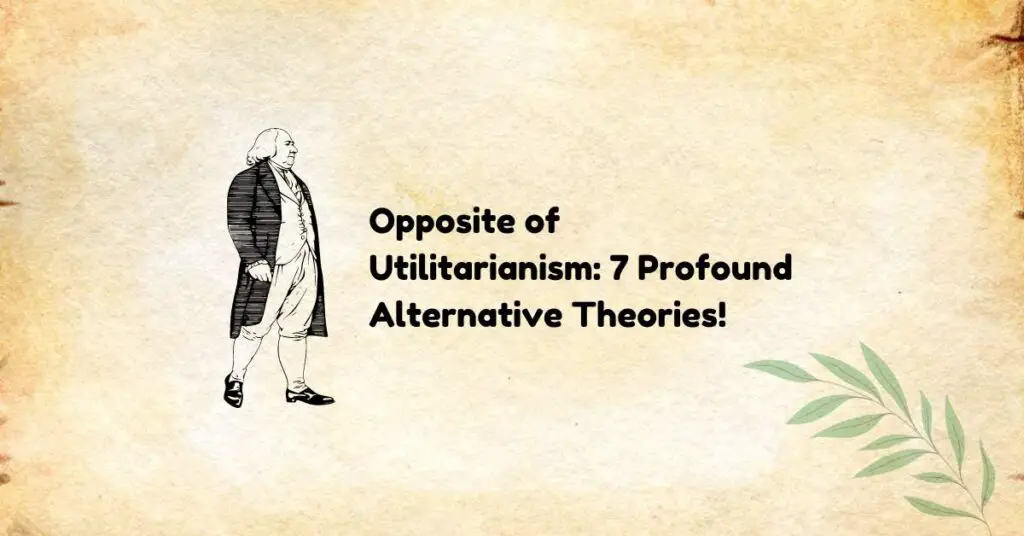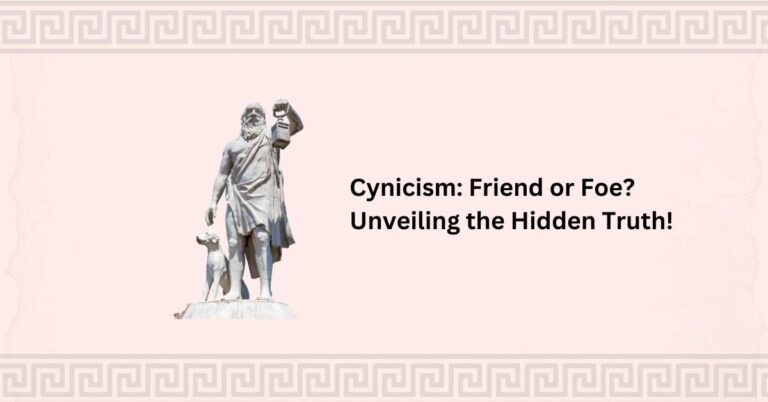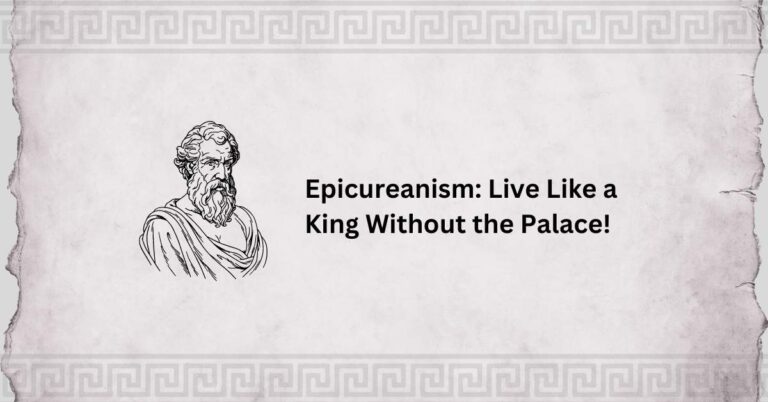Opposite of Utilitarianism: 7 Profound Alternative Theories!
Utilitarianism. It’s a big word, but it has a big idea behind it. Imagine a world where every action you take is judged by how happy it makes people. That’s Utilitarianism in a nutshell.
Utilitarianism is an ethical theory. It says that the best action is the one that brings the most happiness to the most people. Simple, right? It’s all about maximizing happiness and reducing suffering.
In this blog, we’re going to flip the script. We’ll explore ethical theories that stand in opposition to Utilitarianism. By the end, you’ll see how different views shape our understanding of right and wrong.
What is Utilitarianism?
- Core Principles
Utilitarianism is a specific type of consequentialism, an ethical theory that judges the morality of an action based on its consequences or outcomes.
Utilitarianism has some core ideas. First, it’s about the greatest good for the greatest number. Actions are judged by their outcomes. If an action makes more people happy than unhappy, it’s considered good.
- Historical Context
Utilitarianism got its start in the 18th century. Jeremy Bentham and John Stuart Mill were the big names here. Bentham believed in the greatest happiness principle. Mill refined it, saying some pleasures are better than others. These guys laid the groundwork for how we think about happiness and ethics today.
- Applications
You can see Utilitarianism in action everywhere. Governments use it to make policies that affect millions. Think about healthcare, education, and law. They aim to create the most benefit for the most people. Even in our daily lives, we often make choices based on what will make us and those around us happiest.
That’s the basics of Utilitarianism. Now, let’s dive into the theories that challenge it. Get ready to explore a whole new world of ethics.
Ethical Alternatives to Utilitarianism:
While Utilitarianism is all about outcomes, other theories focus on different aspects of morality. These include duty, character, and rights. Let’s explore some major ethical theories that stand in contrast to Utilitarianism.
1. Deontology
Definition: Deontology is an ethical theory that focuses on duty and rules. It says that some actions are morally required, forbidden, or permissible, regardless of the consequences.
Key Thinkers: Immanuel Kant is the most famous deontologist. He believed in absolute moral laws that we must follow.
Core Principles: Kant introduced the idea of the categorical imperative. This means we should act according to rules that we can will to be universal laws. It’s about the intention behind the action, not the outcome. For example, telling the truth is always right, even if it might lead to negative consequences.
Applications: In practical terms, Deontology is seen in laws and personal conduct. For instance, a doctor might refuse to lie to a patient about their diagnosis, even if the truth could cause distress. The duty to tell the truth overrides the potential harm.
Comparison with Utilitarianism: When comparing Utilitarianism and Deontology, it’s like comparing apples and oranges. Both are ethical theories, but their core principles are miles apart. Deontology differs from Utilitarianism in that it doesn’t consider the consequences of actions. Where Utilitarianism would choose the action that maximizes happiness, Deontology focuses on following moral rules. It values intention and principle over outcome.
2. Virtue Ethics
Definition: Virtue ethics is about developing good character traits or virtues, like courage, honesty, and compassion. It’s not just about doing the right thing but being the right kind of person.
Key Thinkers: Aristotle is the key philosopher here. He believed that virtues are habits we develop to live a fulfilling life.
Core Principles: Virtue ethics emphasizes moral character. Aristotle talked about the “Golden Mean,” which is the balance between extremes. For instance, courage is the mean between recklessness and cowardice. It’s about finding the right balance in our traits and behaviors.
Applications: In practice, virtue ethics is about striving to be better in everyday life. A teacher who shows patience and understanding helps students not just by teaching them facts but by modeling good behavior. Virtue ethics values the process of moral development.
Comparison with Utilitarianism: Virtue ethics contrasts with Utilitarianism by focusing on character rather than outcomes. While Utilitarianism asks what action will bring the most happiness, virtue ethics asks what a virtuous person would do. It’s more about personal growth and moral integrity than calculating consequences.
3. Ethical Egoism
Definition: Ethical egoism is the idea that actions are morally right if they benefit the individual who performs them. It’s about pursuing one’s self-interest.
Core Principles: Ethical egoism holds that individuals should act in ways that maximize their long-term self-interest. It argues that if everyone pursues their own interests, society as a whole will benefit. It emphasizes self-reliance and personal responsibility.
Applications: A businessperson might make decisions that increase their profits, even if it means cutting costs in ways that don’t benefit employees. In personal life, someone might choose friends based on how these relationships benefit them, such as networking opportunities or emotional support.
Comparison with Utilitarianism: Ethical egoism is inherently self-focused, whereas Utilitarianism considers the happiness of all affected individuals. Utilitarianism might advocate for sacrificing personal gain for the greater good, while ethical egoism promotes the individual’s welfare even at the potential expense of others. They represent fundamentally different approaches to ethics: one is individualistic, and the other is collectivist.
4. Contractarianism
Definition: Contractarianism is an ethical theory based on the idea of a social contract, where moral norms are derived from mutual agreements among individuals.
Key Thinkers: Thomas Hobbes and John Rawls are central figures in this theory. Hobbes introduced the concept in his work “Leviathan,” arguing that people agree to social contracts to escape the state of nature. John Rawls expanded on this with his theory of justice, emphasizing fairness and equality.
Core Principles: The core idea is that individuals consent, either explicitly or implicitly, to certain rules and norms for mutual benefit. Rawls’s concept of the “veil of ignorance” asks individuals to design a society without knowing their own social position, ensuring fairness and impartiality in creating rules.
Applications: Contractarian principles are evident in democratic governance and legal systems. For example, the U.S. Constitution can be seen as a social contract that outlines the rights and responsibilities of citizens. Public policies, such as welfare programs, are often justified through the idea of mutual benefit and social agreements.
Comparison with Utilitarianism: While Utilitarianism focuses on outcomes and the greatest happiness, contractarianism emphasizes fair agreements and mutual consent. It’s about the process of creating rules and ensuring they are just and beneficial for all parties, rather than merely focusing on the end results.
5. Intuitionism
Definition: Intuitionism posits that moral truths are known through intuition. It suggests that some ethical truths are self-evident and can be grasped without needing empirical evidence or logical deduction.
Core Principles: This theory relies on the idea that humans have a natural, instinctive ability to recognize right and wrong. Intuitive knowledge is seen as immediate and not subject to external validation.
Applications: Intuitionism guides many of our everyday moral decisions. For example, most people intuitively feel that lying or stealing is wrong without needing a detailed justification. This immediate moral sense helps guide quick decisions in various situations.
Comparison with Utilitarianism: Intuitionism contrasts sharply with Utilitarianism’s empirical approach. While Utilitarianism requires calculating potential outcomes to determine the right action, intuitionism trusts gut feelings and immediate moral insights. It’s like the difference between using a calculator and trusting your instincts to solve a problem.
6. Rights-Based Ethics
Definition: Rights-based ethics focuses on the importance of individual rights. It asserts that people have certain inherent rights that must be respected, regardless of the consequences.
Key Thinkers: John Locke is a foundational figure, advocating for natural rights to life, liberty, and property. These rights are seen as fundamental and inalienable.
Core Principles: This theory emphasizes protecting individual rights such as freedom of speech, the right to privacy, and the right to due process. Rights are viewed as moral shields against actions that would otherwise harm individuals, even if those actions would result in greater overall happiness.
Applications: Rights-based ethics are evident in legal systems that protect individual freedoms. For instance, the right to free speech is upheld even if the expression of certain views might be offensive or harmful to the public good. Human rights organizations also operate on this principle, advocating for the protection of fundamental rights worldwide.
Comparison with Utilitarianism: Rights-based ethics prioritize individual rights over collective happiness. While Utilitarianism might justify violating some rights for the greater good, rights-based ethics hold that such rights are inviolable. It’s the difference between protecting the individual against the group and prioritizing overall happiness.
7. Care Ethics
Definition: Care ethics emphasizes the importance of interpersonal relationships and caring for others. It focuses on empathy, compassion, and the context of moral situations.
Key Thinkers: Carol Gilligan is a key philosopher in care ethics. She highlighted the importance of care and relationships in moral reasoning, contrasting it with more abstract, principle-based approaches.
Core Principles: Care ethics values empathy, emotional connections, and the specifics of each situation. It argues that moral decisions should be made based on the needs of those involved and the dynamics of their relationships. It’s about understanding and responding to the unique circumstances of individuals.
Applications: Care ethics is prevalent in professions like nursing, teaching, and social work, where understanding and addressing individual needs is crucial. For example, a nurse might prioritize comforting a patient and understanding their emotional state over strictly following procedural guidelines.
Comparison with Utilitarianism: Care ethics contrasts with the impersonal nature of Utilitarianism. While Utilitarianism uses a broad, outcome-focused approach, care ethics emphasizes personal relationships and the importance of context in ethical decision-making. It’s the difference between a wide-angle lens and a close-up shot, focusing on the intricate details of human relationships.
By exploring these opposing theories, we gain a deeper understanding of ethics. Each theory offers a unique way to think about morality, highlighting different values and principles that guide human behavior. This exploration enriches our perspective on what it means to act ethically in a complex world.
Case Studies and Ethical Dilemmas:
Real-World Examples
- The Trolley Problem (Deontology vs. Utilitarianism)
A trolley is headed towards five people tied to the tracks. You can pull a lever to divert it onto another track, where it will kill one person.
- Utilitarianism: Pull the lever to save more lives, maximizing overall happiness.
- Deontology: Do not pull the lever because actively causing harm (killing one person) is wrong, regardless of the outcome.
- Business Decisions (Ethical Egoism vs. Utilitarianism)
A CEO must decide whether to cut costs by laying off employees or find another way to maintain profitability.
- Utilitarianism: Avoid layoffs to maximize overall happiness among employees and their families.
- Ethical Egoism: Lay off employees if it maximizes the CEO’s and shareholders’ long-term profits.
- Healthcare Allocation (Rights-Based Ethics vs. Utilitarianism)
A hospital must allocate a limited number of life-saving treatments.
- Utilitarianism: Allocate treatments to maximize the number of lives saved.
- Rights-Based Ethics: Ensure that each patient has an equal right to access treatment, regardless of the potential outcome.
Analysis
Trolley Problem:
- Deontology: Emphasizes the importance of moral duties and the impermissibility of actively causing harm, even for a greater good.
- Utilitarianism: Focuses on the outcome, justifying actions that maximize overall happiness, even if they involve harm.
Business Decisions:
- Ethical Egoism: Prioritizes self-interest and personal gain, potentially leading to decisions that benefit a few at the expense of many.
- Utilitarianism: Considers the broader impact on all stakeholders, aiming for the greatest good.
Healthcare Allocation:
- Rights-Based Ethics: Prioritizes individual rights and equality, ensuring fair treatment for all patients.
- Utilitarianism: Seeks to maximize overall health benefits, potentially at the cost of individual fairness.
Criticisms and Debates:
- Deontology:
- Criticism: Too rigid and not considering the consequences can lead to morally questionable outcomes.
- Response: Emphasizes the importance of moral rules and the integrity of actions, preventing harmful practices justified by good outcomes.
- Virtue Ethics:
- Criticism: Lacks clear guidance on specific actions, too focused on character.
- Response: Stresses the development of moral character, leading to better decision-making over time.
- Ethical Egoism:
- Criticism: Promotes selfishness, potentially harmful to others.
- Response: Argues that self-interest can lead to positive outcomes for society as individuals strive to better themselves.
- Contractarianism:
- Criticism: Assumes all parties can agree on fair terms, which might not be realistic.
- Response: Provides a foundation for social justice and mutual benefit through fair agreements.
- Intuitionism:
- Criticism: Relies on subjective feelings, which can vary greatly between individuals.
- Response: Suggests that intuitive moral knowledge is a fundamental part of human nature and provides immediate moral guidance.
- Rights-Based Ethics:
- Criticism: Can conflict with utilitarian goals of maximizing overall good.
- Response: Protects essential human rights and ensures that individuals are not sacrificed for collective benefits.
- Care Ethics:
- Criticism: Too context-specific, lacks universal applicability.
- Response: Emphasizes the importance of empathy and relationships, providing a more humane approach to ethics.
Conclusion:
Understanding the various ethical theories that oppose Utilitarianism broadens our perspective on morality. Each theory—whether it focuses on duty, character, self-interest, social contracts, intuition, rights, or care—offers unique insights into ethical decision-making.
By exploring these theories, we see that morality isn’t one-size-fits-all. Different situations call for different approaches, and each theory provides valuable tools for navigating the complex landscape of ethical dilemmas.
Ultimately, appreciating these diverse perspectives helps us make more informed and compassionate choices in our everyday lives.



